 |
|
 |
|
| About Us | Essential Library | Read Past Issues | Resources | Composer Links |
|
Kitty Brazelton
In the quest to discover the music of the 21st century, a great place to start is this recording of five works by Kitty Brazelton, even though all of them were composed in the final years of the 20th century. But just as historians frequently state that the 20th century really only began in earnest with the onslaught of the First World War, it also ended earlier than expected with the fizzling out of the Cold War and the subsequent emergence of a world where nothing seems so certain anymore. And just as the music of the 20th century reflected the geopolitics of the 20th century with all its competing -isms attempting to overthrow previous notions of how order could be established, the music at the dawn of the 21st century is a borderless powder keg. Unlike any other new music in the past, this new music of the 21st century is being advanced as much by women composers as men composers. A deeper plunge into its origins reveals that the seeds for this music were planted in the 20th century and can be traced back to the Women's Rights Movement in the late 1960s and the subsequent emergence of a generation of women composers not beholden to any of the dogmatic -isms of 20th century music, all of which were created by men. Growing up during this empowering time, Kitty Brazelton started jamming, leading bands (as vocalist and songwriter) and writing chamber music in the early '70s. Brazelton's past three decades of music creation demonstrate her ability to bypass the "isms": her '70s group Musica Orbis wove medieval plainchant into free jazz, folk song, "George Crumb classical" and acid rock while her '80s band Hide The Babies plumbed arena rock and heavy metal for inspiration, her '90s nine-piece 'rockestra' Dadadah fused charted song structures with improvisation while Hildegurls, her late '90s recasting of a Hildegard von Bingen morality play with fellow women composer/performers Eve Beglarian, Lisa Bielawa and Elaine Kaplinsky, became a Lincoln Center sensation. Brazelton's current project, the "digital-chamber-punk band" What Is It Like To Be A Bat?, employs fixed- and real-time computer-generated materials in live performance. "Music is a living language spoken between listeners and music-makers," Brazelton says. "Like any language, despite the solidifying effect of notation and recordings, music evolves. We don't segregate our increasingly multilingual music-listening, and we can't primly parse out our music-making, either. We can't say what needs to be said in languages that no longer reflect the way we live." For Kitty Brazelton and other composers of her generation and beyond, there is no longer an uptown or a downtown, no hermetically-sealed classical music and no must-be-shied-away from pop music, and there's no longer a clear dividing line between the irrefutable will of a composer and the dutiful obeisance of a performer. Brazelton, like many of these new composers, is a composer-performer and is equally at home writing a string quartet or playing in a punk rock band. Kyle Gann describes the music of these composers as totalist, since it embraces the totality of music-making possibilities. Another appellation, "21st-century schizoid music," implies the unpredictability and volatility of this multiple-personality music.
|
PROTESTING A PULITZER: A critic who heard the world premiere of Henry Brant's Ice Field last December in San Francisco is stunned that the work won this year's Pulitzer. "Entertaining at best, the composition's only distinction was being one of the most pointless and frustrating concert experiences in my memory." San Francisco Classical Voice 04/09/02 MORE ON ICE FIELD: The Pulitzer "was given to a piece that is by no means an easygoing, conventional piece. I regard it [the prize] as an encouragement to keep going the way that I go." Los Angeles Times 04/10/02 BETTER LATE THAN NEVER: "Montreal-born composer Henry Brant has some advice for young artists of all sorts. 'Take care of yourself until you're old enough to do your best work. That's when everything becomes clearer what's important and what's less important, and how to proceed.' Nobody could accuse him of failing to heed his own advice: At the age of 88 he's in good health and has just won a Pulitzer Prize for composition." The Globe & Mail (Toronto) 04/13/02 TURNING OPERA AROUND: Tom Morris is "the man who is giving opera a good name. And it's not just the heads of the opera and theatre establishment who are craning their necks to see how it's done. It's everyone." They're coming to the backside of South London to his Battersea Arts Center for productions like "Jerry Springer: The Opera - a vulgar, violent, crude and thrilling work-in-progress which set the travails of the freaks and misfits of daytime television to an exhilaratingly promiscuous score. At less than a fiver a ticket, audiences and critics couldn't get enough of the Lesbian Dwarf Diaper Fetishist, the Chick with a Dick or the Fighting Bitches, and fought for returns outside the stuffy 150-seater auditorium." The Telegraph (UK) 04/10/02 MIXED MESSAGES: Part of the trouble with the classical music profession is that the recording industry seems to have a profoundly different idea of what classical music is for than do its performers and advocates. "While live music goes on being promoted as a multicolored festoon of passion, thrills, bedazzlement and beauty, the marketing of recorded music at a certain level is more and more emphasizing the calming effect." In other words, orchestras want to be exciting, while record labels want to help people fall asleep. The New York Times 04/14/02 A BEER AND A BUMP AND SOME BACH: There was a time when classical music was not the stuffy, formal, tuxedo-clad beast that it has become. Back in the day (the 18th century, actually,) classical music was, y'know, popular. A 31-year-old Israeli cellist is taking a stab at duplicating the effect, playing Bach in bars, clubs, and all sorts of other places you'd never think of. Baltimore Sun 04/13/02 CUTTING YOURSELF: The Philadelphia Orchestra came up with an outreach program that offered to demystify classical music for those who were new to it. "The format is probably the most elucidating and engaging new experience any orchestra has come up with. The largely young listeners seemed perplexed at first, but after a few minutes you could practically see the lightbulbs go on above their heads." But just as audiences for the new program were building, the orchestra has dropped the series. Why? Money. "A bigger penny-wise, pound-foolish miscalculation the orchestra hasn't made in years." Philadelphia Inquirer 04/09/02 SAME OLD DIRGE: Surely with all the wonderful music out there, official funerals could offer something other than Chopin's Funeral March, that dirge that gets trotted out for every important death. "Can no one compose a better send-off than the dreary third movement of Frederic Miseryguts Chopin's Sonata number two in B-flat minor?" London Evening Standard 04/10/02 THE MAKINGS OF A CAREER: "Why do some splendid performers enjoy major international careers and other equally splendid performers do not? And how to explain why certain flashy performers have thriving international careers, while more substantive performers never seem to break out of a regional success? It may come down to a certain temperament or drive that propels some artists to popular success. A marketable image, or just an inexplicable something that audiences connect with. The artist makes choices, too." New York Times 04/11/02 AFTER HE'S GONE: Musicians of the Montreal Symphony seem unrepentant that they provoked music director Charles Dutoit to quit the orchestra. "In the past year or so it's become intolerable. The musicians are constantly berated or they're insulted or there are sarcastic comments." So what comes now for Canada's top orchestra? "In terms of its international prestige, if it can't find a conductor of high quality to replace him, a period of decline will inevitably take place." Canada.com (CP) 04/11/02
|
Wins 2002 Pulitizer Prize
Electronic Dialogue/14 An Interview with Gloria Coates
In 1986, Coates was one of the 10 finalists for the International Koussevitsky (KIRA) Award which honors a living composer for an important work for her composition "Music on Open Strings." She has been the recipient of numerous awards, commissions and distinctions. Coates' music has been performed by leading soloists, ensembles and orchestras such as the Bavarian Radio Symphony Orchestra, Brooklyn Philharmonic, Stuttgart Philharmonic, Milwaukee Symphony, Saint Paul Chamber Orchestra, the London Sinfonia, Polish Chamber Orchestra, various international chamber ensembles including Das Neue Werk Hamburg, the Dresden Ensemble for New Music and the Kronos Quartet. Her work Music on Open Strings, written in1973 for orchestra, was premiered at the Warsaw Autumn of 1978 and proved to be the most widely discussed work on the Festival. In 1979 she was commissioned to write a work for the East Berlin Festival, the first non-socialist composer ever to be performed on it. Some other Festivals include the Dresden Festival, New Music America - New York 1989, Musica Viva Munich, The New York Microtonal Festival, Henze's Festival Montepulciano, Passau International Festival, and the Dartington Festival in England. From 1969 to 1989, Coates lived in Europe where hers was a powerful voice on behalf of American music. She has lectured, written musicological articles, produced and broadcast radio programs, and organized a concert series of German-American music in Munich from 1975 - 1984. Since 1989 Gloria Coates has divided her time between the United States and Europe. In addition to her composition, she is a trained painter and the CD covers featured in this article are photos of her work. Coates'
canon of work includes compositions for orchestra (13 symphonies), chamber
(7 string quartets) and solo music, vocal (a song cycle on poems by Emily
Dickinson), choral music, live electronic and music for the theater. Her
string quartets 1, 5 and 6 have just been released on Naxos CD.
S21: You are best-known for your symphonies. How do you decide what constitutes a symphony? What elements must a work contain to be a symphony rather than, say, an Essay as Barber sometimes called his pieces)? Does your definition somehow relate to Mahler's idea that a symphony is a work that contains everything it takes to make a "world?"
Classical Grammy Winners |
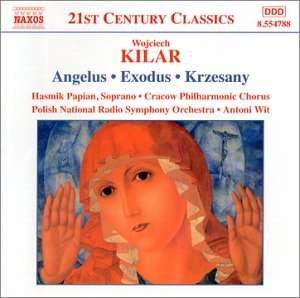
Angelus; Exodus; Krzesany Composer: Wojciech Kilar Conductor: Antoni Wit Performer: Hasmik Papian Naxos - #8554788 Not as well-known as his fellow Poles, Kilar is, nonetheless, extremely well-known in the world of film where he has written music for more than 100 movies. His music is strong, theatrical and filled with adenture. Nothing here is less than dramatic and much is downright unforgettable. |
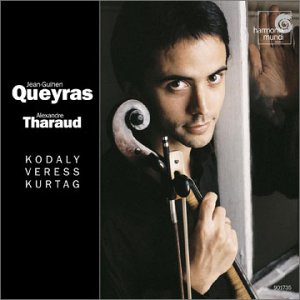
Cello Works Composer: Kodaly, Veress, Kurtag Performer(s): Jean-Guihen Queyras, Tharaud Harmonia Mundi Franc - #901735 Marvelous playing from young Queyras whose technique is so formidable that he makes Kodaly's torturous and melancholy Sonata for Solo Cello, Op.8 sound like fun, which may be the wrong idea, but is no less awesome for the performance. Highly recommended. |

Chanson D'Amour Composer: Amy Beach Performer: Emma Kirkby Ensemble: The Romantic Chamber Group of London Bis - #1245 Amy Beach's setting of Victor Hugo's L'aube naît, et ta porte est close! may have come after settings by Donizetti, Gounod, Lalo and Widor but hers is better than any of the boys.' |
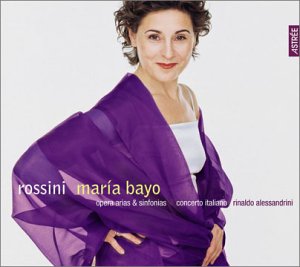
Opera Arias and Overture Composer: Gioachino Rossini Conductor: Rinaldo Alessandrini Performer: Maria Bayo Ensemble: Concerto Italiano Astree - #8853 |

Thomas and Beulah Composer: Rita Dove and Amnon Wolman Performer(s): Ursula Oppens & Cynthia Haymon Innova Records - #559 A theatrical song-cycle based on the Pulitzer Prize-winning collection of poems by Rita Dove, Thomas and Beulah, traces the lives of her grandparents. In live performance hanging scrims and theatrical lighting were used to separate and illuminate each audience section, providing a physical parallel to the music¹s changing points of view. This dramatic setting is recaptured on the multi-media portion of the disc. Wolman's perfectly-integrated music incorporates computer-generated sounds, often combined with acoustic instruments. |

Why is this night different?, Tuireadh, Visions of a November Spring Composer: James MacMillan Performer: Robert Plane Ensemble: Emperor String Quartet Bis - #1269 MacMillan's writing seems to inhabit two worlds: modern choral works that are often dissonant and suggest elements of Messiaen; yet they also reflect harmonies and plainsong-influenced melodic lines that are as old as the ages. You don't need to be a believer to appreciate the sounds of the spirits he brings to life.
|
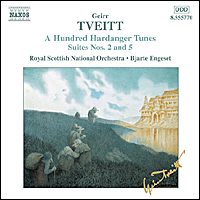
Hardanger Suites Nos.2 & 5 Composer: Geirr Tveitt Peformer: Royal Scottish National Orchestra Bjarte Engeset, conductor The latest offering from Naxos from the greatly underrated Norwegian genius Geirr Tveitt. Tveitt studied in Leipzig, Vienna and Paris with teachers including Honegger, Villa-Lobos and Wellesz, but his cosmopolitan style stemmed mainly from deep roots in his familyís native Hardanger region, whose folk tradition Tveitt made his own in these richly imaginative orchestral suites. "If a leaf grows on a birch tree," he said, "It has to be a birch leaf." |

Piano Concertos 1 and 2 Composer: Stojowski BBC Scottish Sym OrchGeorge Hyperion - #67314 Yet another in Hyperion's endless series of romantic piano concertoes, these two glorious, high-spirited works are the product of the imagination of a Polish composer named Sigismond Stojowski who is today a completely forgotten name to all but the most dedicated piano aficionados. Like so many "discoveries" in this invaluable series, one wishes the programmers would give the Grieg and the Schuman a rest and play some of these gems for a change. |
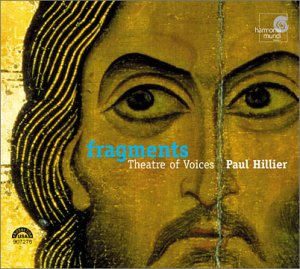
Fragments Performer(s): Theatre of Voices, Hillier Harmonia Mundi Franc - #907276 Not contemporary, of course, but strangely "modern" and invaluable for those who aren't quite sure where Arvo Part, John Tavener or James MacMillan are coming from. |
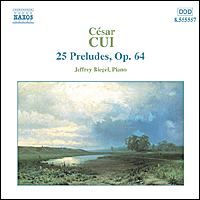
25 Preludes, Op. 64 Composer: César CUI Performer: Jeffrey Biegel Naxos - #8555557 |

Piano Sonatas Nos. 6 & 8 Composer: Sergei Prokofiev Performer: Francois-Frederic Guy Naive - #4898- François-Frédéric Guy sounds amazingly like a young Sviatoslav Richter as he powers his way through the climaxes of Prokofiev's demanding scores. Yet, he can also play quietly (as in the Sixth Sonata's Allegretto). One suspects we'll be hearing more about young Mr. Guy. |
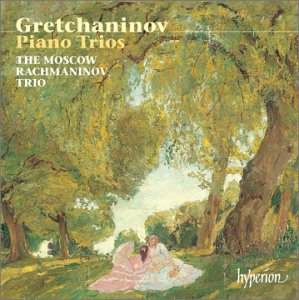
Piano Trios / Cello Sonata Composer: Leo Brouwer Performer: Elena Papandreou Naxos - Fans of late romantic chamber music will find much to enjoy here. Gretchaninov left Russia after the Revolution, settled in Paris, and eventually moved to New York, where he died in 1956 at the age of 91. His works are Russian, yet also reflect his French and American influences. The performances are excellent. |
|
One-Minute Web Guide The essential guide to intelligent life on the internet |
Publisher: Duane Harper Grant (212) 582-4153 Editor: Jerry Bowles (212) 582-3791 Contributing Editors: Armando Bayolo, Sam Bergman, Joshua Cohen, Karina Cristina Demitrio, Deborah Kravetz (C) Sequenza/21 LLC 2000 |